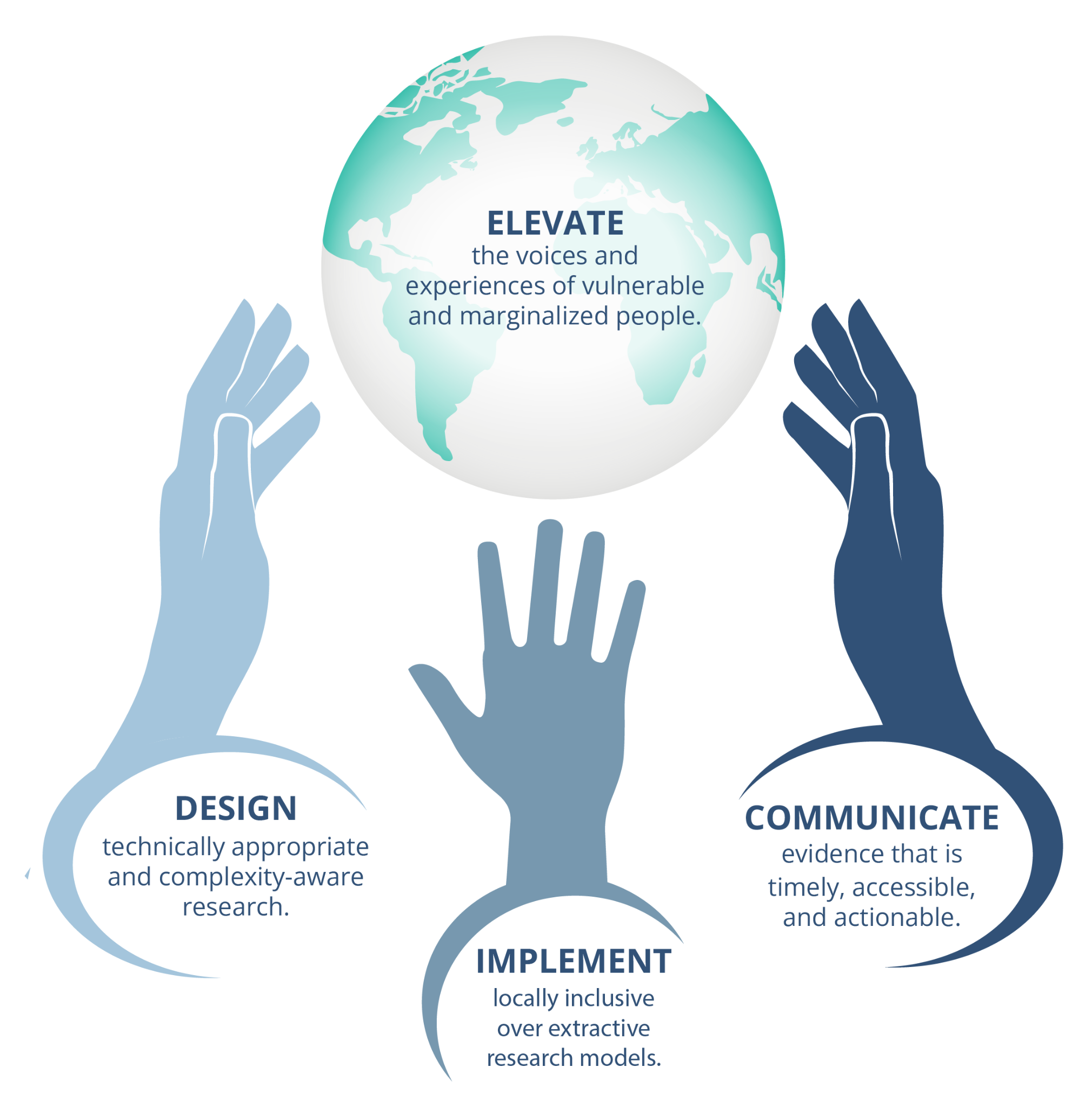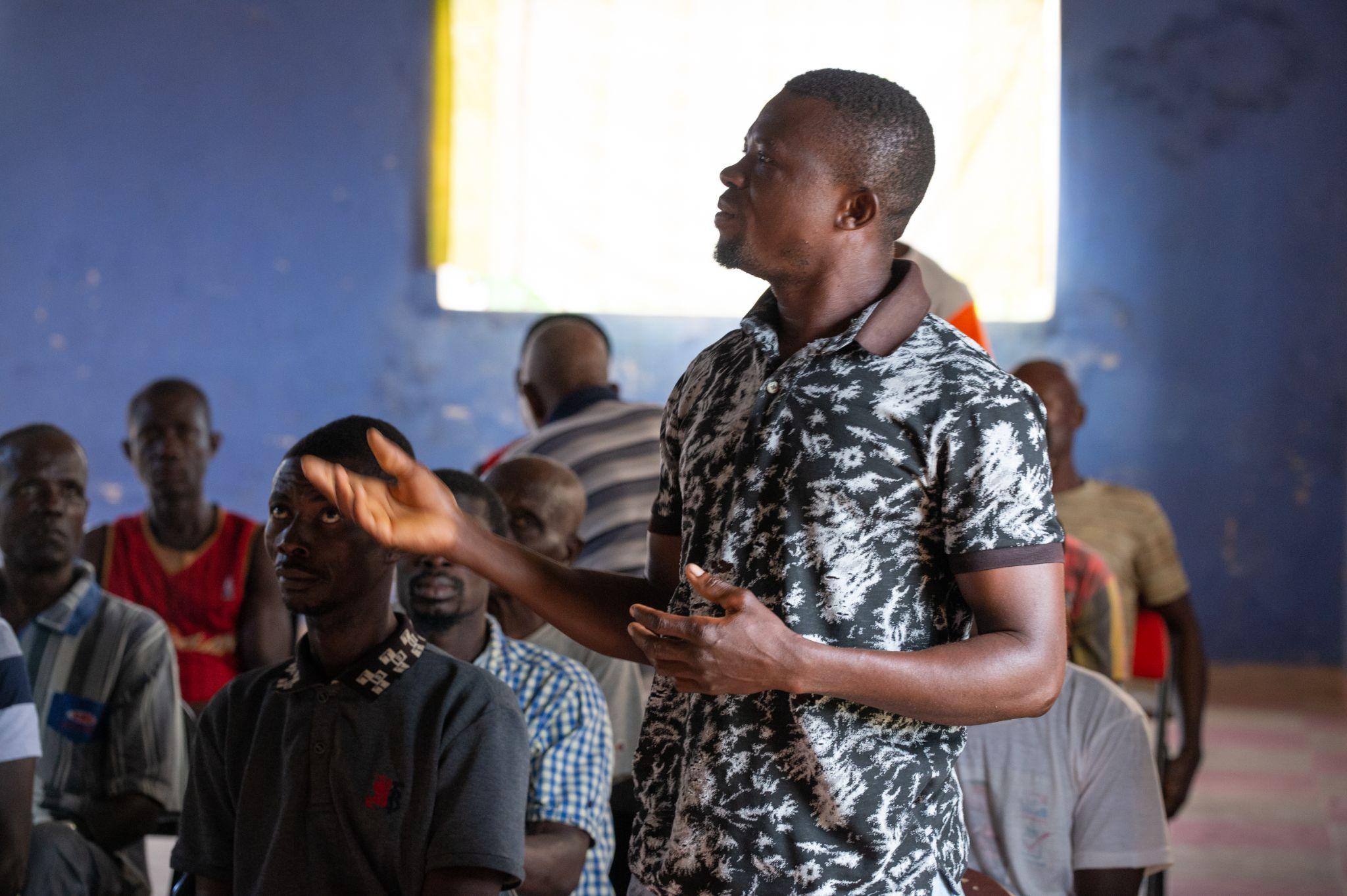Aleta Starosta, Scott Chamberlin
With a long history of implementing monitoring, evaluation, and learning (MEL) activities, The Cloudburst Group (Cloudburst) has solidified a reputation for developing collaborative approaches that engage key stakeholders to ensure that activities are responsive to local context and need. Cloudburst’s work often includes ensuring representation of underserved or marginalized populations including women, youth, and Indigenous populations to ensure their voices and experiences are accounted for in strengthening local programming. Cloudburst’s design, implement, communicate, elevate (DICE) methodology, an innovative approach to evaluation and learning, puts the voice of local communities at its core. Figure 1 below captures each component of the approach.
Figure 1. Cloudburst’s DICE approach to MEL

Cloudburst applies the DICE approach to MEL across methodologies and sectors from environment to democracy, human rights, and governance and beyond. DICE is unique among MEL solutions in that elevating the lived experience of participants is embedded into each phase of the research cycle in an organic and systematic way. DICE particularly excels at examining topics through a cross-sectoral lens and diving into questions about power, incentives, and the formal and informal rules that govern a given system.
For example, Cloudburst is currently conducting a series of assessments of women’s political participation and leadership in Ecuador, Nigeria, and Kenya. These assessments are being used by the United States Agency for International Development’s (USAID’s) Missions to shape upcoming programs across their technical areas, including achieving objectives related to governance and elections, women’s empowerment, and livelihoods. Each assessment design is customized to the specific research participants and data collection tools to reflect the unique context and complexities of each country’s political landscape. Each locally led research team has designed data collection approaches that best fit their cultural context, including distributing surveys through WhatsApp, bringing research participants from high-risk areas to secure central locations, and working together with political party leaders to build buy-in. During data collection and analysis, the evaluation team is mindful of how power and incentives impact the political landscape, such as the differences in experiences between elite women and women from marginalized groups, and tailors its recommendations accordingly.
Cloudburst also applies the DICE approach to impact evaluations to measure changes in development outcomes that are attributable to a defined intervention, program, policy, or organization. In the process, MEL specialists are able to apply localization to these evaluations by collaborating in all phases of research with program participants, implementers, local researchers from non-governmental organizations (NGOs), and institutions of higher learning. These collaborations bring an invaluable understanding of socio-political dynamics and power relationships, as well as local languages, laws, and customs.
“Cloudburst ensures its impact evaluations and other research are gender- and inclusion-responsive by designing a culturally appropriate research methodology that includes developing data collection instruments that appropriately capture context and power dynamics, ensuring representative sampling, and disaggregating results.”
—Kate Marple-Cantrell, Global Development Practice Area Lead
For example, in Ghana, Cloudburst is currently conducting an impact evaluation of four unique interventions aimed at curbing deforestation through improved cocoa farming. A team of Ghanaian and international researchers is currently updating the impact evaluation design for endline, in part by consulting local communities to understand their uptake and experience of the intervention. These innovations are guided along the “design, implement, communicate, evaluate” path, which uniquely ensures that the needs of communities, researchers, and activities are met along the way.

Figure 2. Members of the cocoa farming community of Asankragua, Ghana share their experiences, observations, and concerns with members of Cloudburst’s evaluation team. Incorporating their perspectives into the research helped the research team confirm the design of the final evaluation of USAID’s Supporting Deforestation-Free Cocoa in Ghana activity.
DICE goes beyond research design and implementation to incorporate how learnings are ultimately shared and acted upon. Cloudburst understands that the difference between truly useful and check-the-box MEL is defining the intended use of the evaluation findings with the client at the beginning of the research process, and designing a research methodology that builds client needs into each step of the process. With the DICE approach, Cloudburst communicates evidence that is timely, accessible, and actionable to a wide range of stakeholders. Throughout each evaluation or assessment, there are touchpoints with the client and other stakeholders to co-create and share the evaluation design, present initial findings, and share results and recommendations with the client and other stakeholders via infographics and executive summaries created in local languages with simultaneous translation to ensure participants can engage with the content in their preferred language. By making findings accessible to local stakeholders, including governments, civil society, and universities, Cloudburst elevates the voices of research participants, particularly those from vulnerable and marginalized groups, to ensure they are heard by local decision-makers.
By centering the voices and experiences of local populations at each stage of the company’s MEL work, Cloudburst is able to provide USAID and other clients with technically appropriate, complexity-aware research that is implemented alongside communities and shared widely with local stakeholders. Doing so results in evaluation and learning activities that are contextually rich, incorporate local knowledge in multiple forms, and result in meaningful change.





